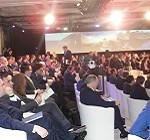Conferences are usually all about exchanging ideas, discussing the latest trends in your field and networking with peers. The Halifax International Security Forum was no exception with participation from over 50 countries, across five continents. Importantly, in such meetings, sometimes, much more can be gleaned from what is discussed on the sidelines, rather than what’s said during scheduled panel discussions.
The main panel discussions at Halifax broadly focused on the themes of the West’s decline, rise of the Asia Pacific, the crisis in Syria, the nuclear deal with Iran, the U.S. withdrawal from Afghanistan, growth of radical extremism in the West, and climate change. While discussions took place more or less within the known parameters of the existing debate on these issues, post-session chats yielded interesting conversations.
For instance, in an off-the-record session on Afghanistan, when everybody spoke about how the West should stabilise Afghanistan, without any single mention of what role India can play, one of the Afghan delegates lamented during the tea break that perhaps this had something to do with India’s own reluctance to take an active role in Afghanistan, beyond the developmental assistance and training of the Afghan National Security Forces. The participant, in fact, sternly observed that India appeared to be more pre-occupied with Pakistan’s concerns on Afghanistan than protecting its own interests there.
Similarly, during a discussion on the growth of extremism in the West, one of the participants working on a project in London to counter the al-Qaeda’s jihadi propaganda bemoaned that despite the West’s celebrated soft power, she was finding it difficult to find relevant and meaningful content which could respond to the al-Qaeda narrative and show an alternative path to young Muslims in the West.
And, after a session on Iran and Syria, some of the scholars – with Republican sympathies – whined that the U.S. under the Obama administration was appearing to be too soft internationally in its dealings with Iran, Syria, Libya and other hotspots in West Asia.
Conversations like these offered helpful insights in understanding the complex world that we live in.
But all the bickering and complaining concluded amicably at a gala reception at Pier 21 – the first port of contact for European immigrants sailing into North America. Freshly-caught, delicious Halifax lobsters were at hand to remind us of the famed Nova Scotia hospitality.
There were other treats in store as the conference came to a close. The Canadian government announced its generous support to the Halifax International Security Forum for another five-year period, till 2018, through an investment of $9.8 million. This is a significant development, since initiatives such as Halifax provide opportunities for security professionals and military analysts to critically reflect upon pressing international security challenges. And, by initiating debates on compelling emergent themes – such as the great power game in the Arctic region and rise of the Asia Pacific order –, the Halifax forum has ensured its pre-eminent position in research and analysis of contemporary international trends.
Sameer Patil is Associate Fellow, National Security, Ethnic Conflict and Terrorism, at Gateway House.
This blog was exclusively written for Gateway House: Indian Council on Global Relations. You can read more exclusive content here.
For interview requests with the author, or for permission to republish, please contact outreach@gatewayhouse.
© Copyright 2013 Gateway House: Indian Council on Global Relations. All rights reserved. Any unauthorized copying or reproduction is strictly prohibited


